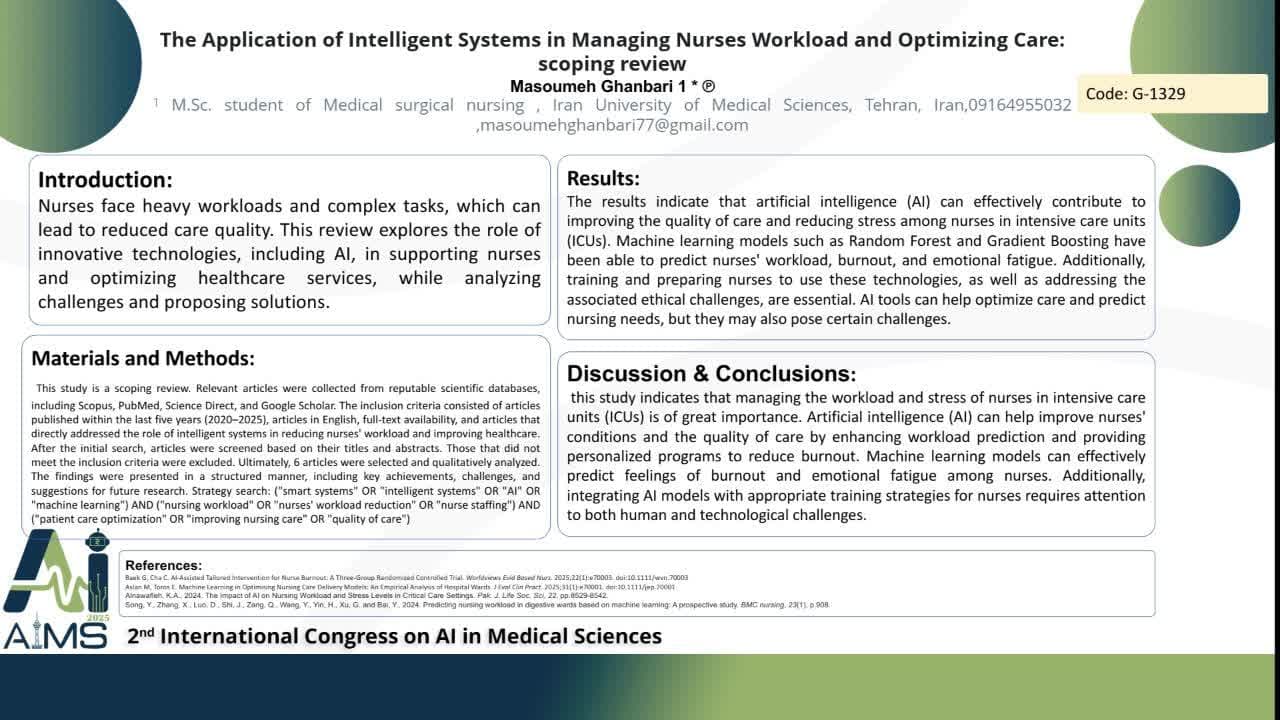The Application of Intelligent Systems in Managing Nurses' Workload and Optimizing Care: scoping review
Code: G-1329
Authors: Masoumeh Ghanbari *, Seyed Arshad Atarpour ℗
Schedule: Not Scheduled!
Tag: Health Policy, Law & Management in AI
Download: Download Poster
Abstract:
Abstract
Background: Nurses face heavy workloads and complex tasks, which can lead to reduced care quality. This review explores the role of innovative technologies, including AI, in supporting nurses and optimizing healthcare services, while analyzing challenges and proposing solutions. Method: This study is a scoping review. Relevant articles were collected from reputable scientific databases, including Scopus, PubMed, Science Direct, and Google Scholar. The inclusion criteria consisted of articles published within the last five years (2020–2025), articles in English, full-text availability, and articles that directly addressed the role of intelligent systems in reducing nurses' workload and improving healthcare. After the initial search, articles were screened based on their titles and abstracts. Those that did not meet the inclusion criteria were excluded. Ultimately, 6 articles were selected and qualitatively analyzed. The findings were presented in a structured manner, including key achievements, challenges, and suggestions for future research. Strategy search: ("smart systems" OR "intelligent systems" OR "AI" OR "machine learning") AND ("nursing workload" OR "nurses' workload reduction" OR "nurse staffing") AND ("patient care optimization" OR "improving nursing care" OR "quality of care") Result: The results indicate that artificial intelligence (AI) can effectively contribute to improving the quality of care and reducing stress among nurses in intensive care units (ICUs). Machine learning models such as Random Forest and Gradient Boosting have been able to predict nurses' workload, burnout, and emotional fatigue. Additionally, training and preparing nurses to use these technologies, as well as addressing the associated ethical challenges, are essential. AI tools can help optimize care and predict nursing needs, but they may also pose certain challenges. Conclusion: this study indicates that managing the workload and stress of nurses in intensive care units (ICUs) is of great importance. Artificial intelligence (AI) can help improve nurses' conditions and the quality of care by enhancing workload prediction and providing personalized programs to reduce burnout. Machine learning models can effectively predict feelings of burnout and emotional fatigue among nurses. Additionally, integrating AI models with appropriate training strategies for nurses requires attention to both human and technological challenges.
Keywords
Intelligent Systems, Nursing Workload, Care Quality
